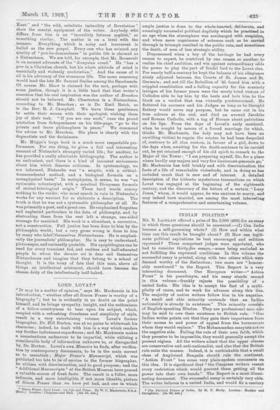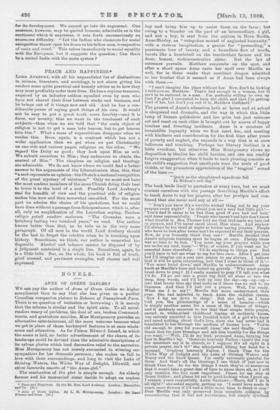INDIAN POLITICS.*
Mn. R. LAIDLAW offered a prize of Rs. 2,000 (266) for an essay in which three questions should be answered :—(1) Can India become a self-governing whole ? (2) How and within what time can this result be brought about ? (3) How can legiti- mate political aspirations be best encouraged and sedition repressed ? Three competent judges were appointed, who had to consider thirty-five essays,—some being excluded as not fulfilling the expressed conditions. In this volume the successful essay is printed, along with two others which were deemed worthy of the distinction; two more are "honour- ably mentioned" in the Report. This Report is a very interesting document. One European writer—" Action Front" is his pseudonym, and his essay stands second in this volume—frankly rejects the possibility of a united India. His idea is to accept the fact of a multi- plicity of races, and to work for advance along this line. The majority of native writers follow him in his negation. "A small and able minority contends that an Indian nationality is already in existence." This minority consiais of English-speaking Hindus. They are professional men wlio May be said to owe their existence to British rule. "Otis Indian writer points out that they gain their importance from their access to and power of appeal from the bureaucrats whom they would replace." The Mohammedan essayists are on the negative side. Failing the rule of their own faith, which they perceive to be impossible, they would generally accept the present regime. All the writers admit that the upper classes are conservative and anti-nationalist, and also that the British rule suits the masses. Indeed, it is unthinkable that a small class of Anglicised Bengalis should rule the continent. "Action Front" has some very plain-spoken comments on this idea. It is significant that "the Congress writers resent every restriction which would prevent them getting all the power into their own bands." The Report is a most illumi- nating document. The successful essay is certainly very able. The writer believes in a united India, and would fix a century • The Political Future of India. By H. P. Mody. London c Hodder and Stoughton. [8e. ed. meta
for its development. We cannot go into its argument. One sentence, however, may be quoted because, admirable as is the eentiment which it expresses, it sets forth unconsciously an enormous difficulty. "Let the Indian who clamours for social veeognition throw open his doors to his fellow-men, irrespective of caste and creed." This refers immediately to social equality with fhe'Europeen, but it suggests the question: °an there be a united India with the caste system ?







































 Previous page
Previous page